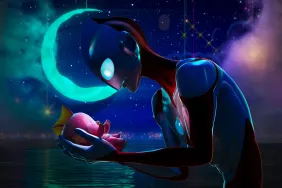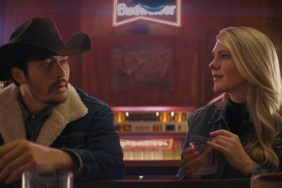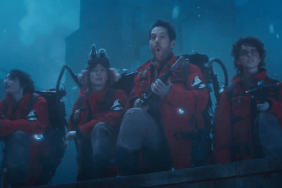
A story published early this morning by The Hollywood Reporter asks the question, “Will New Dragon Tattoo Book Sequel Become a Movie?“, and while I continually hope and pray the franchise isn’t totally dead, no matter all the signs pointing to the contrary, I can’t help but assume I will never see a sequel to David Fincher‘s The Girl with the Dragon Tattoo, or at least not one made the way I would like it to be — Fincher back as director, Rooney Mara and Daniel Craig in the lead roles, and a budget and runtime that allow misfit hacker and ward-of-the-state Lisbeth Salander’s stories to breathe.
Back in February, Mara told E! Online the sequels are recently a fourth entry in the Millennium series — named for the fictional magazine published by Mikael Blomqvist in the novels — was announced, to hit bookshelves this fall. Titled “The Girl in the Spider’s Web” and written by David Lagercrantz, the novel continues Lisbeth’s story, and The Hollywood Reporter notes Sony, which produced Fincher’s adaptation of the first novel, owns the film rights not just to the second and third novels but to this fourth book as well.

So what does a new book mean for the film franchise? Is it still dead to rights, frozen in the Swedish tundra? I’m no studio executive — a shame, as the money would really come in handy right now — but while the release of a new book might give Sony the incentive it needs to consider returning to the franchise, there are still significant issues to work out before the studio would officially press on. Fincher’s film cost $90 million to make and turned a modest profit after earning $233 million at the box office, and it has been said again and again the studio needs to cut costs on any future installments, especially if it wishes to maintain the dark tone of the first film, which is sure to leave some moviegoers from entering the auditorium in the first place.
The Girl with the Dragon Tattoo was always going to be a tough sell given the need for a hard-R rating in order to tell the story properly, and Fincher has always been adamant about exercising full control over his films, both in terms of the actual production process and also the marketing of the finished product. In other words, barring some significant peace treaty between Fincher and the studio, it’s likely the director won’t be returning for any future projects related to the franchise, though I’d be excited even if he was only serving as overseer and executive producer, a la “House of Cards“.
Further, as The Hollywood Reporter continues, there is the issue of how to handle the second and third novels: do they become one movie, and the fourth book becomes the third film in a trilogy, or do they each remain their own individual features? Amy Pascal, the former Sony studio head who produced the first film, seems against the mashing together of books two and three, a move that would force Sony to rewrite or altogether scrap the Steve Zaillian script it paid a few million dollars to secure.
[amz asin=”B0067AC5KA” size=”small”]But given how connected those two books are — they essentially tell one large story over the course of their combined 1,200+ pages — it might make sense to condense them into one long cinematic endeavor, with the bulk of the runtime devoted to “The Girl Who Played with Fire“, the survival-slash-action thriller, while “The Girl Who Kicked the Hornet’s Nest“, its courtroom drama followup, plays second fiddle. The problem then becomes, how does Sony adequately tell these stories? What gets cut out, what gets left in, where are characters and storylines combined, and where are they invented?
I don’t know. I wish I had the answer, but I don’t. There is a lot of meat within those 1,200+ pages, and to condense them into even a three-and-a-half hour film, as long as that seems, would likely be doing the stories a disservice. The novels are so rich, these characters so interesting, that while I want to see them on-screen I also want to see them done right, even if I’m not entirely sure what that means. In my head it means bringing Fincher back and letting him make these films his way, but with that option almost certainly off the table, who takes over? Do the characters get re-cast? What form do these films take?
Another interesting question to ponder: Is the fan-base of those first three novels clamoring for the fourth, or at least interested enough to make Sony consider placing a new film into production in the near future? After all, “The Girl in the Spider’s Web” isn’t the work of late author Stieg Larsson, who wrote the original trilogy of novels, nor is it culled from the manuscripts Larsson left behind when he passed away in 2004. As a fan of the series I’m curious what story the fourth book tells, but my breath isn’t exactly bated. “The Girl Who Kicked the Hornet’s Nest” offers a satisfying conclusion to the series, and I’ve no clue Lagercrantz’s abilities, so while I’m interested, my anticipation level isn’t all that high.
It seems the time for further cinematic adaptations of these books may have passed, but if in fact this fourth novel does breathe life into Sony’s stalled franchise, I’m hopeful the studio can at least bring back its principal actors. Mara’s turn as Lisbeth was nothing short of transformative, Craig is a fine fit as defamed journalist Mikael, and Robin Wright is always pleasant to see on-screen, no matter how big or small her role may be. I guess now those of us who yearn for these sequels just have to wait to see what Sony decides to do, which is no different from what we’ve been doing the last few years anyways.









